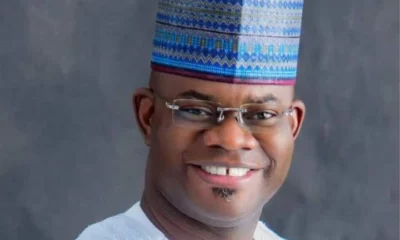Health
Coronavirus – Sanwo-Olu Reveals How Lagos Govt Diagnosed The First Patient


Lagos State Government has raised its level of response to Coronavirus (COVID-19) incident, following a reported case of a patient diagnosed with the infectious viral disease in the State in the early hours of Friday.
This is coming, just as the Chief Incident Commander and the State Governor, Mr. Babajide Sanwo-Olu, offered more information on how the patient was identified and efforts currently being made to prevent the spread of the virus.
The patient, Sanwo-Olu said, is an Ogun State-based expatriate who flew into Lagos from Milan in Italy via Istanbul, Turkey last Monday evening. The Governor said the patient, whose name was not disclosed, remained in stable condition at the bio-security facility in Yaba, Lagos Mainland, where he is being isolated.
It was gathered that the patient, although, tested positive to COVID-19 virus, he is yet to show any respiratory symptoms at press time. He complained of fever and body pain, which prompted his transfer from Ogun State to Lagos for advanced medical investigation.
Sanwo-Olu said a number of persons, who had physical contact with the patient before the virus was diagnosed, are being traced, while others are currently being examined for possible symptoms.
The Governor shared these details during a first press conference held on Friday at the State House in Marina to brief the public on the matter. Top State officials at the conference included Commissioner for Health, Prof. Akin Abayomi, Commissioner for Information and Strategy, Mr. Gbenga Omotoso, Commissioner for Agriculture, Hon. Gbolahan Lawal, Secretary to the State Government, Mrs. Folashade Jaji and Director General of Lagos State Safety Commission, Mr. Lanre Mojola.
Sanwo-Olu said there should be no cause for panic among Nigerians over the reported COVID-19 incident, stressing that measures had been set in motion by the State and Federal governments to contain the spread of the virus across the country. He particularly allayed the fear of Lagos residents, saying the two bio-security facilities in the State had the capability to contain the virus.
He said: “At 10pm on Thursday, I got a call from Commissioner for Health, who reported possible identification of patient with coronavirus in Ogun State. Immediately, we triggered all levels of bio-security responses and containment facilities.
After series of laboratory examination, the patient was confirmed to have tested positive to the virus in early hours of today (Friday) and we immediately alerted the federal authorities, including the President and everybody who needs to be aware. We are in constant touch with the company where the patient was engaged. The management and personnel of the company have been cooperative.
“Health workers and emergency officials are on the field to track all persons that had physical contacts and interaction with the patient. Our bio-security facilities have been fortified to continue any form of test and contain any other potential case. We are in constant touch with the Federal Ministry of Health to harmonise our response to the incident. For us in Lagos, we are doing anything that needs to be done. The patient is stable and every health intervention required is currently being given to him.”
On how the patient scaled through health screening at the Lagos airport without being detected, Sanwo-Olu said investigation showed the virus did not materialised in the patient at the time he passed through the airport. The incident, he said, prompted the Government to immediately trigger advanced end-to-end screening for passengers flying into Nigeria, especially from high-risk countries.
The Governor said there would not be prohibition of public gatherings and regular activities in Lagos despite the diagnosed case of COVID-19, pointing out that such measure may give rise to needless panic among the general public. He said the condition of the patient was not “highly contagious” at the moment, adding that the State would only ban outdoor gatherings in the case of escalation in person-to-person transmission of the virus.
He said: “It is only when there is a high level of escalation that the public can be panicky and this is when we realise that it is getting to person-to-person transmission. As we have said, this isolated case has been contained right from the hospital where he was first admitted and the guesthouse he slept after his arrival in Nigeria. It is when there is a person-to-person infection that we can trigger another level of isolation and curtail public events where large number of people can gather. I don’t think we have gotten to that level yet.”
Sanwo-Olu also cleared the air on why the patient was transferred to Lagos after the incident was reported in Ogun State, saying the Federal Government only established testing centres to prevent to coronavirus in States that have international airports. Lagos, the Governor said, is only State in the Southwest that has testing centres. He said the State was also considered based on its sophisticated bio-security facilities, which were established during the outbreak of Ebola virus.
Prof. Abayomi explained how the diagnosis was carried out, following the patient’s complaint of fever and body pain. He said the patient started to show signs of illness on Wednesday afternoon, after which he was presented at the Ogun State-based firm’s hospital where investigation began.
He said: “Investigation began at the hospital after the patient gave history of his trip to Nigeria. The medical personnel at the company’s hospital kept the patient in isolation overnight and contacted us at the bio-security in Lagos for assistance. We immediately asked them to transfer the case to Lagos. The patient was brought to our high-containment in Yaba on Thursday morning.
“Immediately the patient arrived, he was put in proper isolation and appropriate tests were conducted on him. Within hours, we received signals that the laboratory tests were showing signs of positivity. At that point, we informed the Federal Minister of Health and Governor Sanwo-Olu, who is the Chief Incident Commander in Lagos.”
The Health Commissioner said the patient was responding well under a supportive therapy, saying efforts were on to identify all persons that had physical contact with the patient to break the cycle of transmission.
He disclosed that the State remained prepared to contain potential spread of the virus, observing that Lagos had wrapped up the capacity of its containment facility to 80-bed as a result of the emergency funds released by the Governor.
Prof. Abayomi said more capabilities were being put in place by the State to deal with increase number of cases. He said aggressive public awareness campaign was going on to sensitise residents on hygiene and activities that can prevent the spread of virus.
Health
Cybercriminals Successfully Encrypted Data in Ransomware Attacks on Nearly 75% of Healthcare Organizations, Sophos Survey
Only 24% of Healthcare Organizations Were Able to Disrupt a Ransomware Attack Before Attackers Encrypted Their Data. This is the Lowest Rate of Disruption in 3 Years, reports SANDRA ANI


Sophos, a global leader in innovating and delivering cybersecurity as a service, today shared its sector survey report, “The State of Ransomware in Healthcare 2023,” which revealed that, among those organizations surveyed, cybercriminals successfully encrypted data in nearly 75% of ransomware attacks.
This is the highest rate of encryption in the past three years and a significant increase from the 61% of healthcare organizations that reported having their data encrypted last year.
In addition, only 24% of healthcare organizations were able to disrupt a ransomware attack before the attackers encrypted their data—down from 34% in 2022; this is the lowest rate of disruption reported by the sector over the past three years.
“To me, the percentage of organizations that successfully stop an attack before encryption is a strong indicator of security maturity. For the healthcare sector, however, this number is quite low—only 24%. What’s more, this number is declining, which suggests the sector is actively losing ground against cyberattackers and is increasingly unable to detect and stop an attack in progress.
“Part of the problem is that ransomware attacks continue to grow in sophistication, and the attackers are speeding up their attack timelines. In the latest Active Adversary Report for Tech Leaders, we found that the median time from the start of a ransomware attack to detection was only five days. We also found that 90% of ransomware attacks took place after regular business hours. The ransomware threat has simply become too complex for most companies to go at it alone. All organizations, especially those in healthcare, need to modernize their defensive approach to cybercrime, moving from being solely preventative to actively monitoring and investigating alerts 24/7 and securing outside help in the form of services like managed detection and response (MDR),” said Chester Wisniewski, director, field CTO, Sophos.


Additional key findings from the report include:
- In 37% of ransomware attacks where data was successfully encrypted, data was also stolen, suggesting a rise in the “double dip” method
- Healthcare organizations are now taking longer to recover, with 47% recovering in a week, compared to 54% last year
- The overall number of ransomware attacks against healthcare organizations surveyed declined from 66% in 2022 to 60% this year
- Compromised credentials were the number one root cause of ransomware attacks against healthcare organizations, followed by exploits
- The number of healthcare organizations surveyed that paid ransom payments declined from 61% last year to 42% this year. This is lower than the cross-sector average of 46%
“In 2016, the Red Cross Hospital of Córdoba in Spain suffered a ransomware attack that reached servers and encrypted hundreds of files, medical records and other important patient information. It was a major disruption to our operations and interfered with our ability to care for our patients. The stakes are high in ransomware attacks against healthcare organizations—and attackers know that—meaning we’ll always be a target. After this ransomware attack, we worked hard with Tekpyme to bolster our defenses, and now we have reduced our incident response time by 80%. I think the industry as a whole is making improvements, but there is still work to do, because of the constantly changing nature of cybercrime. Hopefully healthcare organizations can leverage the help that is available from security vendors such as Sophos to prevent a very real ‘threat to life’ if systems go offline due to a ransomware attack,” said José Antonio Alcaraz Pérez, head of information systems and communications at Cruz Red Andalusia in Spain.
“Cyberspace today is ripe with technically sophisticated actors looking for vulnerabilities to exploit. What all this translates to is a multidimensional cyberthreat of actors who have the tools to paralyze entire hospitals. Partnering with the private sector is critical to our mission. The information [they] share has real-world impacts and can save real businesses and real lives,” said Christopher Wray, FBI Director.
Sophos recommends the following best practices to help defend against ransomware and other cyberattacks:
- Strengthen defensive shields with:
- Security tools that defend against the most common attack vectors, including endpoint protection with strong anti-ransomware and anti-exploit capabilities
- Zero Trust Network Access (ZTNA) to thwart the abuse of compromised credentials
- Adaptive technologies that respond automatically to attacks, disrupting adversaries and buying defenders time to respond
- 24/7 threat detection, investigation and response, whether delivered in-house or by a specialized Managed Detection and Response (MDR) provider
- Optimize attack preparation, including regularly backing up, practicing recovering data from backups and maintaining an up-to-date incident response plan
- Maintain security hygiene, including timely patching and regularly reviewing security tool configurations
To learn more about the State of Ransomware in Healthcare 2023, download the full report from Sophos.com.
*The State of Ransomware 2023 survey polled 3,000 IT/cybersecurity leaders in organizations with between 100 and 5,000 employees, including 233 from the healthcare sector, across 14 countries in the Americas, EMEA and Asia Pacific.
Health
LUTH Doctor Slumps And Dies After 72hrs Call In The Neurosurgery Unit


Outrage As LUTH Doctor Dies After 72-hour Non-stop Shift
Tweeps have taken to X to share their thoughts on the death of a young doctor, identified as Dr. Umoh Michael, who died on Sunday after allegedly working 72 hours straight.
According to reports, Michael died during a church service at the United Evangelical Church on September 17. He was said to have worked a 72-hour non-stop shift at the Lagos University Teaching Hospital, Idi-Araba, where he was a resident doctor.
Doctors under the aegis of the Association of Resident Doctors, LUTH chapter, in a letter addressed to the Chief Medical Director, LUTH, Prof. Wasiu Lanre Adeyemo, attested to the fact that the young doctor was overworked.
They claimed Michael returned home at about 3:00 a.m. Sunday after a 72-hour shift in the hospital, adding that he had barely slept in their apartment before that day.
The statement partly read, “We the house officers are in deep grief over the loss of our colleague, a co-house officer (Dr Umoh Michael) who died on 17th September, 2023, after having a 72hrs call in the Neurosurgery Unit.
“He is said to have been on call 72hrs before arriving home on Sunday morning to get set for church service, reaching his worship center (United Evangelical Church) where he slumped in the church at about 11 am.”
“His roommate attested to the fact that Umoh Michael had barely slept in their apartment over the past one week as he was always on call or the day he returned home was around 3 a.m. after surgeries and other activities in the Neurosurgery Unit.”
Reacting to the sad incident, LUTH’s Public Relations Officer, Omolola Fakeye, who spoke on an online platform (not PUNCH) Online said, “It is not true that anybody worked for 72 hours. I have not been briefed about his death.
“We were at a programme yesterday (Monday), but I will find out; I can’t say anything now. I will check the medical report of what could have happened because anybody can say anything, but the medical report will show us what happened.”
May his soul rest in peace.
Health
Why You Need To Drink More Water Than You Use To


Hello! It’s the weekend, And as usual, We want to share some quick important healthy living tips with you.
Today, We will be sharing on the IMPORTANCE OF DRINKING ENOUGH WATER.
Do you know that Adult humans are 60 percent water, and our blood is 90 percent water? Now, There isn’t an agreed quantity of water that must be consumed daily. You only need to drink as plenty as you should.
Water can be said to be one of the highest natural medicines to man, As it helps avoid a lot of sicknesses like kidney stones, And it also helps in their healing process.
Here are a few importance of drinking enough water;
1. It boosts skin health and beauty: With dehydration, the skin can become more vulnerable to skin disorders and premature wrinkling.
2. It cushions the brain, spinal cord, and other sensitive tissues: Dehydration can affect brain structure and function. It is also involved in the production of hormones and neurotransmitters. Prolonged dehydration can lead to problems with thinking and reasoning.
3. It regulates body temperature: Water that is stored in the middle layers of the skin comes to the skin’s surface as sweat when the body heats up. As it evaporates, it cools the body. In sport.
4. The digestive system depends on it: The bowel needs water to work properly. Dehydration can lead to digestive problems, constipation, and an overly acidic stomach. This increases the risk of heartburn and stomach ulcers.
5. Adequate water flushes body waste easily: For sweating and removal of urine and feces.
6. The airways need it: When dehydrated, Airways are restricted by the body in an effort to minimize water loss. This can make asthma and allergies worse.
7. It helps maintain body blood pressure.
8. It prevents kidney damage: The kidneys regulate fluid in the body. Insufficient water can lead to kidney stones and other problems.
9. Consuming enough water instead of sweetened drinks helps with weight loss.
10. Joint Lubrication: Cartilage, found in joints and the disks of the spine, contains around 80% water. Dehydration can reduce the joints’ shock-absorbing ability, leading to joint pain.
Please drink enough water!
-



 Tech4 days ago
Tech4 days agoAnambra School Emerges Winner In National Girls In ICT Competition With Groundbreaking VR Technology
-



 News4 days ago
News4 days agoNiger State Prisoners Run From Facility After Rainstorm Brings Down Part Of Fencing
-



 Politics4 days ago
Politics4 days agoEnugu State Government Flag Off Palliative Distribution In The State
-



 Spotlight4 days ago
Spotlight4 days agoNigerian Woman Breaks Guinness World Record With 55-Hour Interview Marathon
-





 News3 days ago
News3 days agoEFCC: New Documents Extracted Shows Yahaya Bello Allegedly Paid School Fees To The Tune Of $845,852,84 For His Family Members
-



 News2 days ago
News2 days agoKing Charles Reportedly “Really Unwell” And Funeral Plans Are Currently Being Reviewed
-





 Finance2 days ago
Finance2 days agoAISA Has Refunded The Fees Paid By Yahaya Bello To EFCC
-



 Entertainment2 days ago
Entertainment2 days agoBig Congratulations To BBNaija Star, Miracle Igbokwe Who Graduated With Distinction From Embry-Riddle Aeronautical University In Florida USA






